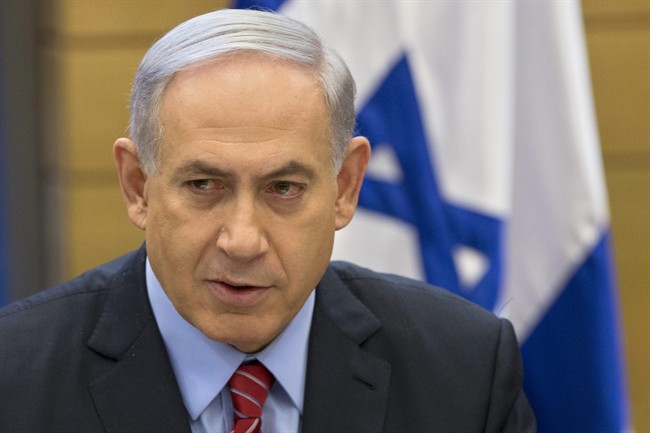It’s been an eventful year in Israeli politics, and 2015 will likely be no different after the prime minister tossed out some prominent cabinet members, dissolved parliament and called early elections for next year.

Love him or hate him, it’s hard to deny Prime Minister Benjamin Netanyahu knows how to stand his ground.
After rifts in his coalition government proved too big to traverse, Netanyahu moved to dissolve parliament and received overwhelming support from members of the Knesset.
An election date is set for March 17.
How did this happen?
In the face of a slumping approval rating, dissent from within the coalition government and a shrinking economy, Netanyahu said “it is impossible to lead a state” with dysfunction in the Knesset.
He fired Finance Minister Yair Lapid and Justice Minister Tzipi Livini, whom he accused of colluding to topple his government then told Israelis it was time to choose a new government.
“This is not an easy thing to do, what I’m doing tonight,” Haaretz reported Netanyahu saying in a televised address Tuesday night. “Frequent elections are not a good thing, but a government with no governability that includes ministers who are working against it from the inside, is much worse.”
READ MORE: Israeli lawmakers approve dissolving parliament
- Starmer’s chief of staff resigns over Mandelson ambassador appointment despite Epstein ties
- Ontario Liberals announce date to select new leader, kicking off race
- Jivani’s trip to Washington has some Conservative MPs scratching their heads
- As he unveils his archives, former PM Harper says he was a team player
After the 2013 vote, Netanyahu formed a centre-right coalition with Lapid’s Yesh Atid party, which held the most seats in the Knesset after Netanyahu’s Likud party, and Livni’s Hatunah party.
“Israel is a vibrant, liberal democracy, similar to Canada in many ways. But, their proportional system puts them in a situation of perpetual minority government, relying on coalition,” said Noah Shack, Deputy Director of Research at the Centre for Israel and Jewish Affairs.
Shack said Canadians, who saw a series of minority governments until the Conservatives finally won a majority in 2011, may be able to relate to the political instability of the Israeli parliament.

Get breaking National news
Can Israel expect a new prime minister?
“It’s not likely there will be another prime minister,” said Dr. Mira Sucharov, an associate professor of political science at Carleton University.
A poll released Monday put Netanyahu’s approval rating at 38 per cent. Compare that to early August, at the height of Operation Protective Edge — the Israeli Defense Force’s name for its 50-day combat mission against Hamas and other Palestinian factions in the Gaza Strip — when he had a 77 per cent approval rating.
But opinion polls on Tuesday showed there’s a pretty good chance Netanyahu will hold on to his post: his Likud party would come out ahead of its rivals if an election were held today, according to two polls conducted by Israeli television networks.
“I don’t think a whole lot will change. It just might be that the personalities switch around a little bit among his coalition partners,” she said.
What were the issues that caused such trouble?
There were three things that caused tension between Netanyahu and his rival, said Sucharov.
The state of Israel’s economy and the cost of living is a big one and it appears one of the final straws for Netanyahu was Lapid’s budget and a proposed value-added tax exemption for first-time home buyers.
There was also disagreement among members of the centre-right coalition over Netanyahu’s own bill that would recognize Israel as a Jewish nation-state, putting religious identity ahead of secular democratic principles.
And then there is the “so-called peace process” with the Palestinians, at a tipping point after the 50-day combat mission in the Gaza Strip and a series of terror attacks in Jerusalem.
What are the election issues?
Netanyahu faced harsh international criticism for the high number of Palestinian deaths during Operation Protective Edge and human rights groups have accused Israel of using excessive force.
But, it’s not Netanyahu’s handling of the crisis that will be the deciding factor for Israelis — who could cast their votes as early as March.
“Israel is not, in fact, defined by conflict, just as… the Palestinians aren’t defined by conflict,” said Shack.
READ MORE: Israeli lawmakers make hard-line proposals after Palestinian attacks
He said there was “broad cross-partisan support” among Israeli lawmakers for Netanyahu’s decision making during the conflict.
“Security definitely features in Israeli elections, but increasingly the economic issues are becoming more prominent,” he told Global News.
But Israel’s economic stability is tied to security and the conflict with the Palestinians.
Why should Canadians pay attention?
Shack said Canada’s “deep, long-standing” relationship with Israel transcends party lines and party leaders, pointing out a recently modernized free-trade agreement with Israel was originally established under the Liberal government of Jean Chretien.
But no matter how strong a bond the Canadian government has with Israel, don’t expect to see any sort of Canadian endorsement heading to the polls.
“Allies don’t tend to want to interfere too much in the electoral workings of their allied country,” Sucharov said. “But, it will be interesting to see if there are any whispers out of the Canadian government as the process in Israel is unfolding.”








Comments